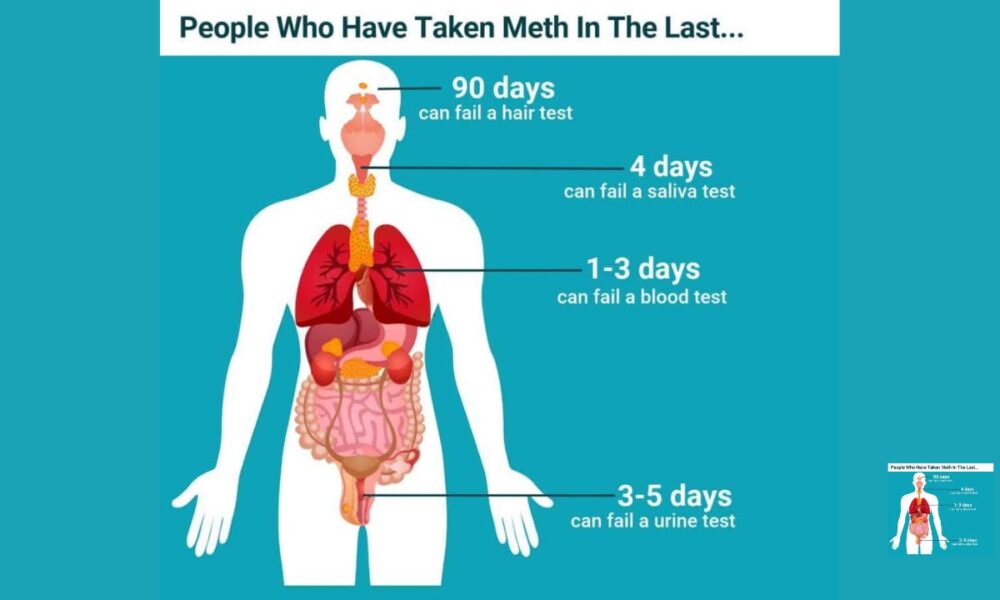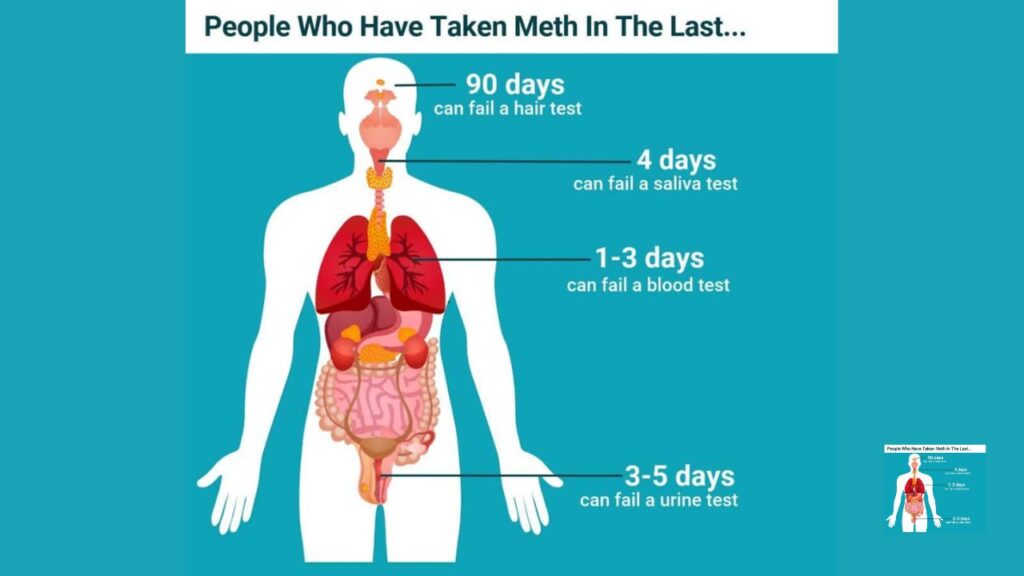
How Long Does Meth Stay In Your System
The duration methamphetamine (meth) stays in the system varies depending on several factors, including the individual’s metabolism, the amount taken, the frequency of use, and the type of test used to detect it. how long does meth stay in your system
- Urine: Meth can be detected in urine for approximately 3 to 5 days after use, though in chronic users, it may be detectable for up to a week or more.
- Blood: Meth is detectable in blood for about 1 to 3 days after use.
- Saliva: Meth can be detected in saliva for about 1 to 4 days after use.
- Hair: Meth can be detected in hair follicles for up to 90 days or more after use.
Methamphetamine, commonly known as meth, is a powerful, highly addictive stimulant that affects the central nervous system.

Chemical Composition and Forms
Chemical Structure: Methamphetamine is chemically similar to amphetamine, a drug used to treat ADHD and narcolepsy. Its chemical formula is C10H15N.
Forms: It can appear as a crystalline powder or in crystalline chunks called “crystal meth” which resemble clear crystals or bluish-white rocks.
Methods of Use
Ingestion: Meth can be swallowed in pill form.
Snorting: Powdered meth can be inhaled through the nose.
Smoking: Crystal meth can be heated and smoked, leading to rapid absorption into the bloodstream.
Injection: Meth can be dissolved in water or alcohol and injected directly into the bloodstream.
Effects on the Body and Brain
Short-term Effects: Increased wakefulness, physical activity, decreased appetite, rapid heart rate, increased blood pressure and body temperature, euphoria, and increased energy.
Long-term Effects: Addiction, severe dental problems (“meth mouth”), extreme weight loss, skin sores, anxiety, confusion, insomnia, mood disturbances, and violent behavior.
Neurological Impact: Meth use can lead to significant changes in brain structure and function, affecting areas involved in memory, emotion, and decision-making. Chronic use can result in cognitive deficits and emotional disturbances.
Addiction and Dependence
Addiction: Meth is highly addictive due to its intense euphoric effects. Repeated use leads to tolerance, requiring higher doses to achieve the same effect.
Withdrawal Symptoms: Fatigue, increased appetite, sleep disturbances, depression, and intense drug cravings.
Health Risks
Cardiovascular Problems: Increased risk of heart attack, stroke, and other cardiovascular issues.
Mental Health Issues: Increased risk of developing severe anxiety, paranoia, hallucinations, and psychosis.
Infectious Diseases: Sharing needles increases the risk of contracting HIV/AIDS, hepatitis, and other infectious diseases.
Legal Status
Controlled Substance: Methamphetamine is classified as a Schedule II drug in the United States, meaning it has a high potential for abuse and is available only through a nonrefillable prescription for limited medical uses.
Treatment and Recovery
Treatment Options: Behavioral therapies, including cognitive-behavioral therapy (CBT) and contingency management, are effective. There are no specific FDA-approved medications for methamphetamine addiction, but research is ongoing.
Support Systems: Support groups and rehabilitation programs can provide crucial help for individuals recovering from meth addiction.
Getting Help for Methamphetamine Use
You or someone you know is struggling with methamphetamine use, it’s important to seek help as soon as possible. Here are some steps and resources that can assist in overcoming methamphetamine addiction:
Steps to Take
- Acknowledge the Problem: Recognizing that there is an issue is the first step towards recovery.
- Reach Out for Support: Talk to friends, family, or a trusted person about your situation. Their support can be crucial.
- Seek Professional Help: Contact healthcare professionals who specialize in addiction. This can include doctors, therapists, and addiction specialists.
- Consider Rehabilitation Programs: Enrolling in a rehabilitation program can provide a structured environment to support recovery.
- Join Support Groups: Groups such as Narcotics Anonymous (NA) offer peer support and can be very effective.
- Develop a Recovery Plan: Work with professionals to create a plan tailored to your needs. This might include therapy, medication, lifestyle changes, and ongoing support.
Resources
- National Helpline: The Substance Abuse and Mental Health Services Administration (SAMHSA) offers a national helpline at 1-800-662-HELP (4357). They provide confidential, free help, from public health agencies, to find substance use treatment and information.
- Find a Treatment Center: Use SAMHSA’s treatment locator to find a facility near you: Find Treatment
- Online Resources and Support Groups: Websites like Narcotics Anonymous (NA) provide information on meetings and support options: NA Meetings
- Therapists and Counselors: Consider finding a therapist specializing in addiction through directories like Psychology Today: Find a Therapist
Self-Care and Coping Strategies
- Healthy Lifestyle: Focus on nutrition, exercise, and adequate sleep.
- Mindfulness and Relaxation Techniques: Practices such as yoga, meditation, and deep breathing exercises can reduce stress and improve mental health.
- Avoid Triggers: Identify and avoid situations, people, or environments that may trigger a desire to use methamphetamine.
- Build a Support Network: Surround yourself with positive influences and people who support your recovery journey.
Emergency Help
If you or someone you know is in immediate danger or experiencing a crisis, call emergency services right away. In the US, dial 911 for emergency assistance.
Encouragement
Recovery from methamphetamine use is challenging but possible. With the right support and resources, individuals can overcome addiction and lead healthy, fulfilling lives.
Methamphetamine in Your System
How long does meth stay in your system?
- Urine: Meth can be detected in urine for up to 3-5 days after use.
- Blood: Meth can be detected in the blood for about 1-3 days.
- Saliva: Meth can be detected in saliva for about 1-4 days.
- Hair: Meth can be detected in hair for up to 90 days or longer.
What factors influence how long meth stays in your system?
Several factors can affect the duration meth stays in your system, including:
- Dosage and frequency of use: Higher doses and more frequent use can extend detection times.
- Metabolism: People with faster metabolic rates may process and eliminate meth more quickly.
- Age: Younger individuals may metabolize drugs faster than older adults.
- Body mass: Those with higher body fat percentages may retain meth longer, as it is lipophilic (fat-soluble).
- Overall health: Liver and kidney function can impact how quickly meth is processed and eliminated.
Can you speed up the elimination of meth from your system?
While there is no guaranteed way to rapidly eliminate meth from your body, staying hydrated, eating a healthy diet, and exercising may support your body’s natural detoxification processes. However, these methods do not guarantee a negative drug test result.
How is meth detected in drug tests?
Meth can be detected through various types of drug tests, including:
- Urine tests: The most common method for drug screening.
- Blood tests: Less common but can detect recent use.
- Saliva tests: Useful for detecting recent use within a short window.
- Hair tests: Can provide a longer detection window but are less commonly used.
Why is it important to know how long meth stays in your system?
Understanding the detection window of meth is important for several reasons:
- Drug testing: Knowing the detection times can help individuals understand when they might test positive.
- Health and safety: Being aware of how long meth affects the body can inform decisions about use and seeking medical help.
- Legal implications: Knowledge of detection times can be relevant in legal contexts, such as probation or employment.
What are the potential health risks of meth use?
Methamphetamine use can have severe health consequences, including:
Short-term effects: Increased heart rate, elevated blood pressure, hyperthermia, and erratic behavior.
Long-term effects: Cognitive deficits, dental problems (“meth mouth”), cardiovascular issues, and mental health disorders.
If you or someone you know is struggling with methamphetamine use, it is important to seek professional help and support. There are many resources available for treatment and recovery.